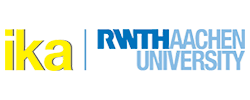Address:
Institute for Automotive Engineering (ika)
RWTH Aachen University
Steinbachstraße 7
52074 Aachen · Germany

About IKA
The Institut für Kraftfahrzeuge (ika) of RWTH Aachen University is Europe’s leading institute in automotive engineering and directed by Professor Lutz Eckstein. Starting from the idea to innovative concepts for components and systems up to vehicle prototypes the staff of the institute creates and designs the future vehicle. In cooperation with car manufacturers and suppliers, ika is making an acknowledged contribution to help solve current and future global challenges.
The divisions Chassis, Body, Drivetrain, Electrics/Electronics and Driver Assistance represent the classic automotive domains and cooperate closely with the cross-divisional departments of Strategy and Consulting, Vehicle Concepts, Acoustics, Thermal Management as well as Driver Experience and Performance in an interdisciplinary manner. This wide range of expertise enables analysing and optimising the vehicle as a whole, while paying attention to the complex interactions between the individual subsystems. The divisions are linked by focusing on the various features of the vehicle; safety, energy efficiency and driving experience. In this process ika is involved in the development of the idea, up until the completion of a finished prototype, focusing on the demands of sciences and industry. The institute’s extensive infrastructure is the basis for intensive research for large parts of the automotive industry, as well as for publically funded research by the EU as well as on a federal and national level. In addition to the drive, battery, chassis and tire test benches it also comprises acoustic, thermal dynamic and servo hydraulic research facilities. Furthermore, it is enriched by a full vehicle crash test facility, a driving simulator, by test tracks as well as latest measurement technology and up-to-date simulation environments.
Main role in the project
ika is responsible for the definition of overall testing, validation and certification methodologies and procedures. In addition, is contributing to the:
• State of innovation and gap analysis;
• Development and demonstration of applied test methodology;
• Procedures, environments and tools having experience from PEGASUS data base activities;
• Communication with the German automotive industry, authorities, research and international cooperation with Japan and USA.
